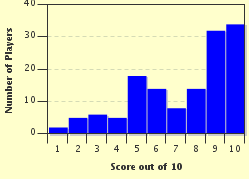Quiz Answer Key and Fun Facts
1. "Speak to the Israelites and say to them: 'When you cross the Jordan into Canaan, drive out all the inhabitants of the land before you. Destroy all their carved images and their cast idols, and demolish all their high places. Take possession of the land and settle in it, for I have given you the land to possess.'" (Numbers 33 v. 51-53)
Most of the inhabitants of Canaan banded together to fight against the Israelites. The Gibeonites, though, had other ideas having heard what the Israelites had done at Ai and which other walled city?
2. A Gibeonite delegation was sent to meet with Joshua and the Israelite leadership. They met at a place whose name has spiritual significance elsewhere in the Old Testament. Which of the following was the location for their talks?
3. The Gibeonites set out to deceive through their appearance. What were they trying to make the Israelites believe?
4. The Israelites were so taken in by the Gibeonites at their meeting that they forgot to do which crucial thing?
5. The Israelites had been duped by the Gibeonites. How long did it take them to work this out?
6. What was the reaction of the ordinary Israelites when they discovered that their leaders had made a covenant to protect a people who were not what they said they were?
7. After these events soon after the Israelites' arrival in Canaan, which service did the Gibeonites provide within Israel?
8. Israel's agreement to help the Gibeonites was called in almost immediately and they came to their aid after Gibeon was attacked. The biblical account speaks of God raining down giant hailstones from Heaven. Which other miracle is said to have occurred at Joshua's request?
9. The Israelites had given their word that they would protect the Gibeonites. Centuries later, the family of Israel's first king would be held accountable for his trying to wipe out the Gibeonites. Who was this king?
10. "The Lord will rise up as he did at Mount Perazim, he will rouse himself as in the Valley of Gibeon - to do his work, his strange work, and perform his task, his alien task." (Isaiah 28 v. 21)
What is this seemingly unlikely work of God, to which Isaiah refers?
Source: Author
glendathecat
This quiz was reviewed by FunTrivia editor
CellarDoor before going online.
Any errors found in FunTrivia content are routinely corrected through our feedback system.

